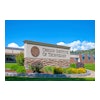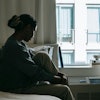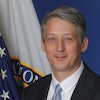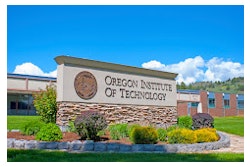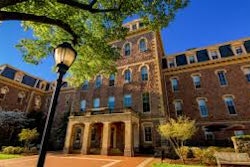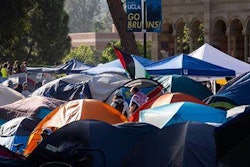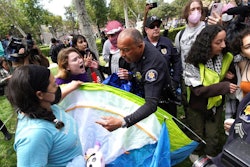What constitutes protected free speech and antisemitism on college campuses were key topics discussed Thursday during a webinar hosted by the American Council of Trustees and Alumni (ACTA).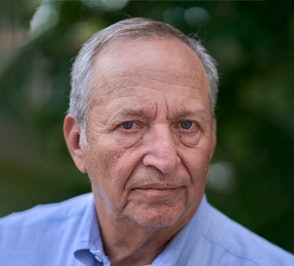 Dr. Lawrence Summers
Dr. Lawrence Summers
The event, "Antisemitism, Academic Freedom, and Board Leadership," brought multiple scholars and higher ed leaders together to offer their thoughts on the current state of antisemitism on U.S. college campuses and what university trustees can do in the face of it.
Panelists criticized higher ed institutions, leaders, and trustees for what they saw as insufficient or altogether-missing pushback against rising antisemitism in the higher ed sphere. According to Jewish campus organization Hillel International, there have been 1,275 reported antisemitic incidents on campuses since Oct. 7, marking a 700% increase compared to the same time period the year before.
“I think it's unfortunate that higher education leaders have not responded to encroaching antisemitism in the way that they have responded to other instances of prejudice,” said panelist Dr. Lawrence Summers, a former Harvard University president.
Though not the only school to face criticism for not quelling antisemitism on its campus, Harvard – often viewed as the posterchild for elite higher ed institutions – has become a focal point for many critics. This comes amid former president Dr. Claudine Gay’s controversial testimony to Congress last December, after which she apologized and resigned from her position.
Summers criticized the school’s trustees, claiming that they had demonstrated “consistent and ongoing failure to this day” when it came to insisting that Harvard set “an appropriate moral tone.” Such is also the case at many other institutions, he added.
But not all involvement from trustees is appropriate, and knowing when to intervene requires the ability to discern issues of fundamental principle from issues of political viewpoint, Summers said.
“In a number of states in our country, there has been excessive political intrusion by public trustees into the work of universities, attempts to prescribe what books cannot be taught in courses, to insist on particular versions of American history,” he said. “So, it is not as simple as saying trustees need to assert themselves. They need to assert themselves wisely, which means having the ability to distinguish between issues of fundamental principle and issues of political viewpoint."
Those who complain that any criticism of Israel is deemed antisemitic and that it silences legitimate criticism are either deflecting or confused about the difference between the two, said panelist Dr. Pamela Paresky, director of the Aspen Center for Human Development and visiting senior research associate at University of Chicago’s Institute on the Formation of Knowledge.
Paresky also claimed that the chant, “Jews will not replace us,” which was used by white supremacists meant the same as popular pro-Palestine chant, “From the river to the sea, Palestine will be free.” The latter has been nothing short of an embattled phrase, with protesters claiming either that it calls for eradication of Israel or freedom for Palestinians.
Antisemitism on college campuses isn’t necessarily always pronounced and obvious, said panelist Dr. Eli Noam, director of the Columbia Institute for Tele-Information. It can be insidious and systematic, influencing the presence – or lack thereof – of Jewish people among trustees, leadership, and students, he said.
Citing the 43-year presidency of former Columbia President Dr. Nicholas Butler, Noam pointed out that there had only been two Jews on the school’s board of trustees during Butler’s lengthy tenure.
Jewish students have also historically been systemically kept out of higher ed, including among Ivy league institutions, said Noam, who served in the Israel Air Force during its 1967 and 1973 wars. During the 20th century, schools configured admissions processes to disadvantage Jewish students indirectly through means such as testing and student caps, according to the Washington Post.
“Antisemitism, on some level, is one of those you-know-it-when-you-see-it situations. You feel it, especially on the receiving end,” Noam said. He drew a comparison between those concerned about antisemitism and those concerned about racism.
“Does anyone require those who condemn and rightly condemn racism to provide a definition of racism? Does anybody who protests George Floyd's situation post-murder have to explain their outrage?” Noam said. “When almost all Jewish students, by surveys, feel seriously or somewhat affected by antisemitism on campus, do you then still have to engage in politicized wordsmithing exactly about the definition?”
To note, according to a 2022 poll from U.S. News & World Report, more than 40% of Americans are unconvinced that systemic racism exists in the U.S.
Matters of free speech and antisemitism on campuses became frequent topics of discussion in the mainstream in the months after Hamas’s Oct. 7 attack on Israel, which killed approximately 1,200 Israelis and foreigners. Israel’s concerted military response to the attack has killed over 33,000 people, including more than 13,000 children, in Gaza alone as of April 11, according to Al Jazeera.
The Oct. 7 attack by Hamas – a U.S. State Department-designated terrorist organization – comes as the continuation of decades of conflict between Israel and Palestine, a political situation which has led to apartheid under international law on Israel’s part, according to human rights groups Amnesty International and Human Rights Watch.

